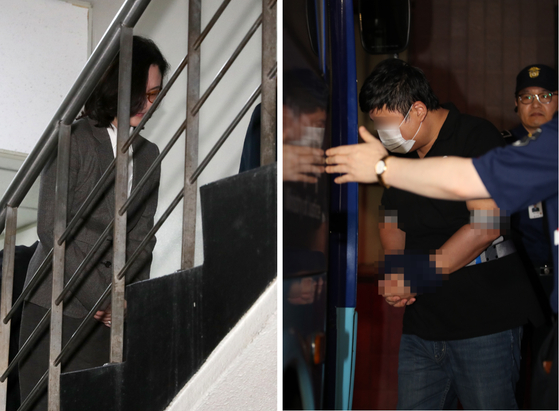![Professor Kyung-Shim Chung (left) and his nephew Jomo (right) of former Minister Cho Kuk [연합뉴스]](https://i0.wp.com/pds.joins.com/news/component/htmlphoto_mmdata/202101/29/0f34f0e7-9d4d-4a49-9cc8-0b2e4481e6f5.jpg?w=560&ssl=1)
Professor Kyung-Shim Chung (left) and his nephew Jomo (right) of former Minister Cho Kuk [연합뉴스]
Cho’s 5th niece, grand nephew, was sentenced to 4 years in jail and a fine of 50 million won in the same manner as the first trial in the appeal of the former Minister of Justice Cho Kook’s alleged corruption in the family private equity fund.
The 11th Criminal Division of the Seoul High Court (Judges Ja-Heon Koo, Bong-Heon Kim, and Eun-Hye Lee) maintained the judgment of the first trial against Cho on the 29th, with the exception of some charges.
As the beneficial owner of private equity fund manager Kolink PE, Cho was charged with attempting to boost stock prices through false disclosures and stealing money from private equity funds (e.g. embezzlement or dismissal under the Specific Economic Crime Weighted Penalty Act).
Prof. Kyung-Shim Chung’s embezzlement allegedly “lack of evidence”
The appeals court did not further acknowledge the collusion relationship between Cho’s spouse, Dongyang University professor Chung Gyeong-shim, and Mr. Cho. The appellate court’s decision, unlike the first trial, was the alleged violation of the Capital Markets Act in relation to the report of false changes related to the’Blue Fund’ invested by the former minister’s family.
The court judged, “It is a false change report to report to the Financial Services Commission the amount of investment by Professor Jeong and his younger brother’s children at 350 million won.” According to the Capital Markets Act, the’minimum investment’ of a limited liability member of a private equity fund is over 300 million won. The court ruled that the fact that Mr. Jo reported inflating the amount even though he knew that they had invested 50 million won was a false change report.
However, it was difficult to admit that the evidence submitted by the prosecution alone was enough to judge that Professor Jeong conspired with Cho for this crime.
In connection with Mr. Cho’s embezzlement of 150 million won in’Korink PE’ and sending it to Professor Jeong, Professor Jeong was not recognized as an accomplice of embezzlement. The Ministry of Justice said, “In order to be admitted to conspiracy for embezzlement in business, it is necessary not only that the company received corporate funds, but also that it was actively conspired for embezzlement, but it is difficult to admit this only with evidence submitted by the prosecution.”
Instead, as with the first trial, Mr. Cho admitted to the collusion relationship with Professor Jeong in the same manner as in the first trial regarding the allegations (destruction of evidence, concealment teacher) in which Mr. Cho ordered the staff of Korink PE to delete materials containing the names of Professor Jeong’s children.
Rejection of the allegation of’power-type corruption crime’ by the court
The court explained that Mr. Cho’s crime was “embezzled or abolished by all kinds of illegal methods such as false change reports and false disclosures, and violated the Capital Markets Act.” He explained the reason for the need for severe punishment, saying, “The total amount of damage was over 7 billion won due to the repeated crimes of the defendant, and this damage was actually passed on to ordinary shareholders and investors and did not recover.” He also cited the disadvantage of dismissing the purpose of the corporate disclosure system and undermining the fairness and transparency of the securities market.
In addition, “Mr. Cho destroyed the evidence related to private equity when the media raised suspicion of private equity during the hearing of former Minister Cho Kook,” he said. However, it was revealed that Mr. Cho confessed to all of the crimes and referred to the sentence for favorable circumstances, such as that he was seriously reflecting.
The court did not accept the prosecution’s decision in the trial, saying, “It also rejects allegations regarding the unfavorable sentencing case of’power-type corruption crime’.”
In June of last year, the first trial admitted guilty of 20 out of the 21 charges of Mr. Cho and sentenced him to four years in prison and a fine of 50 million won. At the appeal trial, the prosecution sought six years in prison and a fine of 50 million won.
Reporter Lee Sujeong [email protected]
